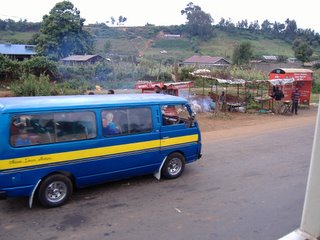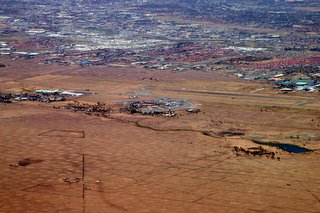Camp at Lake Naivasha

We rumble off the main road into "Fisherman's Camp" on Lake Naivasha by early afternoon.
It's a place shaded by tall acacia trees and sprawling masses of bougainvillea flowers.
There are birds everywhere, chirping and whistling. Brown ibises stalk warily about and iridescent-blue starlings hop near us as we set out the makings of a late lunch on a long table by the truck.
Sitting on camp stools over sandwiches and Tusker beer, we have a general camp meeting.
More formal introductions are made: our family of four are the only Canadians. Everybody else is either English, Scottish, Irish, or South African.
General camp and safety rules are laid out. I think the prospect of camping in Africa made everbody quite attentive.

For instance, you wouldn't want to break the rule of going down to the lake-front at night. There is a small electric fence there now because a camper was killed by a hippopotamus at this same campsite this past spring. Hippos often wander up onto the shore near our camp to graze at night.
Peering down the lake's shoreline with our binoculars, we could see massive boulder-like objects snoozing in the mud, occasionally lifting a broad head to look placidly around. The resident hippos are peaceful enough from a distance but notoriously ill-tempered and dangerous when their escape route to water is cut off. Their bite can chomp a human in half.
Aside from this word of caution, our camp looked like a nice place to stay. The showers were in a wooden enclosure, the water warmed by a wood-stove. And the toilets flushed, after a fashion, when you pulled a long chain.

We shared the campground with a few other African families. One was a group of black-robed Muslim women who had brought a few red cattle along with them.











